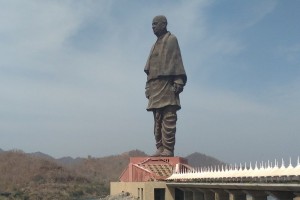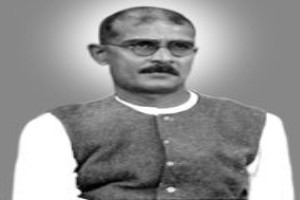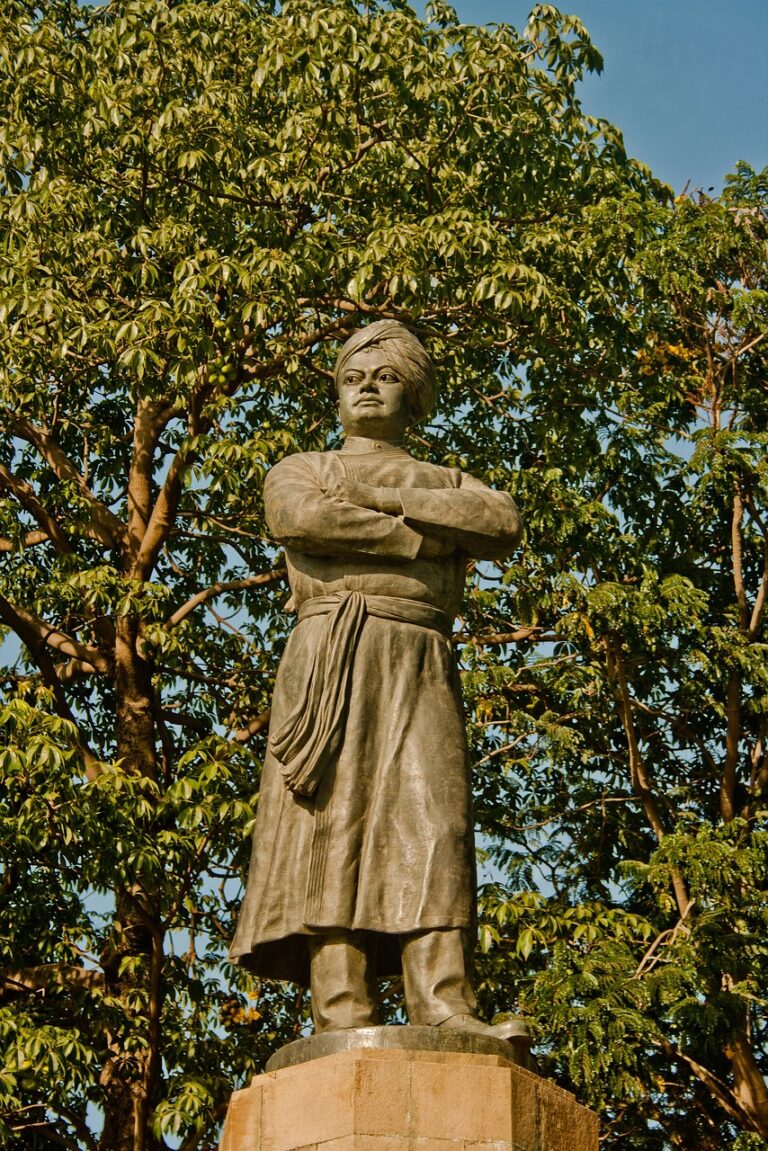
With Sardar Patel in Tamilnad – Part 1
 By Mahadev Desai*
By Mahadev Desai*
When I had the privilege of touring with Gandhiji in the different provinces of India, I often wished that I had rather be one of the multitude of people anxious to have a glimpse of him and crying ‘Mahatma Gandhiji Ki Jai’, than be one of Gandhiji’s party. I envied the lot of those admiring crowds, I longed to feel like them, I wanted to share their surging emotions, so that I might give a photographic picture of their minds. But it was not then possible. During this tour with Shri Vallabhbhai I have laboured under the same handicap and yet have had an advantage too. The handicap is there when I see thousands of young men crowding the places of meetings he addresses, punctuating his straight, direct, utterances with deafening applause, and getting ‘more hungry when he most satisfies.’ I should have loved to write this Tamilnad letter as one of the thousands of students who have now heard Shri Vallabhbhai Patell – if I may spell the name according to the Madras students’ pronunciation of it. I am glad they do not call him Petrel – the stormy petrel that some of the elder people would like to compare him to. The advantage I have referred to lies in this, that this is the first time I am visiting the province without Gandhiji, and I can have an idea of how people feel about him and his principles even when the thrilling excitement of his presence is not there.
‘Veni, Vidi, Vici’
I will not take the reader through the heated controversy that raged in the Vedaranyam Conference over the resolution asking the Lahore Congress to change the creed to one of Independence. Shri Vallabhbhai had made no secret of the fact that he regarded the resolution as not only contrary to the spirit of the Calcutta resolution, but that he regarded it as unnecessary, and although he ultimately agreed to preside, he had hoped that he would not be placed in the unenviable position of having to divide the province on a futile issue. But his hopes and requests were of no avail. He found that the Conference had been called on the set purpose of passing that resolution, and he had to perform the most painful duty of giving his warning to the Conference in the most unmistakable terms. He adverted to the inconsistency of the proposition with another resolution of the Provincial Committee, as also with the compromise arrived at in Calcutta. He also pointed out that the resolution was unnecessary and premature. ‘I have not come to do anything prejudicial to the prestige of your province, I have not come to sow seeds of discord,’ he said. ‘But having come I should be failing in my duty if I did not tender my advice. There is time enough for you to prepare. You may yet make yourself so strong that when your opinion comes to be placed before the Lahore Congress, it might be irresistible. But until then, please wait and implement the Calcutta resolution. That resolution provides not so much for a change of creed in a particular contingency as for a particular programme of work. Get ready if you can for that programme.’ He did not know what effect his warning would have on the delegates who had listened to numerous speeches on either side with rapt attention. When however the vote was taken, it was found that an overwhelming majority rejected the proposition. It was not an overwhelming majority opposed to independence and supporting Dominion Status. The issue was not there before the Conference. The issue was whether the existing creed came in the way of the country carrying out the national programme, and if it did it should be scrapped. The Conference accepted the advice of its President that there was nothing wrong with the creed, and that if we were no nearer the goal, it was because we would not bestir ourselves but keep on talking. In his concluding address he sounded the clarion call to the country, and the effect appeared to be electric. ‘He came, he saw, he conquered,’ I heard someone say as the Sardar was leaving the pandal. Well, if he did, he did so in spite of himself. He was reluctant to go to Tamilnad to score a victory over any one, but he could not shirk the issue when once it was forced on him.
The Meaning
But if he saw and conquered, let us see what he saw, what he conquered. He went to Pudupalayam and spent a day there before the Conference. He did not go there to understand the Brahman non-Brahman problem from an interested quarter, as some non-Brahman papers foolishly said, but he went to see the people among whom he has found “work cut out” for himself. And nothing could have provided a more appropriate background. He saw scores of famine-stricken Panchamas come to Shri Rajagopalachariar’s Ashram to receive their weekly supply of cheap grain. He saw impoverished villagers crying for want of mere drinking water, and he saws crowds of ignorant and superstitious people threatening to boycott the band of workers and their Ashram, because they had by removing untouchability and destroying caste distinctions brought down the curse of God upon them in the shape of four successive droughts! And no wonder these wretched folk should cut their noses to spite their faces, as in spite of these famines they had had to pay revenue assessment every year.
Also read: History Recalled: When Ahimsa won him a friend
Shri Vallbhbhai had touched on the Khadi question and on the Brahman non-Brahman problem in his presidential address, but the things that he saw sent the iron into his soul, and that explains the burning lava which he has poured out before several audiences since his arrival in Madras. ‘He is a volcano covered with ice,’ Maulana Shaukatali had said about him in 1923 when he came to Borsad, and a truer thing has not been said about him. All these years since the Nagpur Flag Satyagraha he has confined himself to Gujarat, never gone out of the province, and if he has, he has never opened his lips. Having however been compelled to come, he could no longer retain the seal on his lips, and he poured out his heart wherever he went. The result is that he has conquered the hearts of the thousands he has addressed, and that victory is greater than any other victory.
If we analyse the victory still further, we should find that it was not so much a personal triumph that awaited him, but a triumph of Gandhiji and his old non-co-operation programme. The union and taluka boards of Tiruvarur, Tirutaraipundi, Mannargudi, Nannilam, all along his way to and back from Vedaranyam, presented him with addresses of welcome in which they laid especial emphasis on his being the foremost disciple of Gandhiji and the hero of Bardoli. Everywhere Shri Vallabhbhai laid the greatest emphasis on the futility and even the harmfulness of the Council programme and the vital importance of the life-giving constructive programme. “You refer in sneering terms to the charkha. But the little man in the loincloth is plying his wheel on one bank of the Sabarmati, whilst on the other seventy five chimneys are belching out volumes of smoke, and scores of mill-owners keeping those monsters going at the expense of crores of rupees of capital that they have sunk into them. In any other country the man would be looked upon as a lunatic. But you cry ‘Mahatma Gandhiji Ki Jai’ and want him to be president of the Congress. Now I ask you, who is mad? Is he mad or are you mad?” he asks the audiences. ‘We are Gandhi-mad,’ once came the reply, and the Sardar quickly retorted, ‘No, you are not; if you really were Gandhi-mad, yoiu would have had Swaraj today.’ And then for upwards of an hour he keeps the audience spell-bound, not because he is a finished speaker, not because he can weave fine phrases out of a foreign tongue, but because he speaks in no uncertain accents and with an authority which no one can question.
Not that the things he has said have not been said before or cannot be said now by someone from the province itself. But who can bring to bear on his utterance the detachment that Shri Vallabhbhai has done on his own, and what can invest the utterance with power, save the confidence that comes out of something done and achieved? ‘If you want Gandhiji to preside, you must be prepared to accept his leadership and his programme. We have long exploited his name. It was not to be exploited any more, and I am going to put my foot down on it,’ he said at a public meeting; and an eminent leader, belonging by no means to the no-change party, said: ‘Your speeches have been a revelation. You have laid your unerring finger on the right spot. The thing you are doing was badly needed, and I am thankful you could be persuaded to spend a little time in the province.’
(To continue…)
*Mahadev Desai was an eminent freedom fighter and Mahatma Gandhi’s personal secretary; article courtesy his grandson, Nachiketa Desai.




